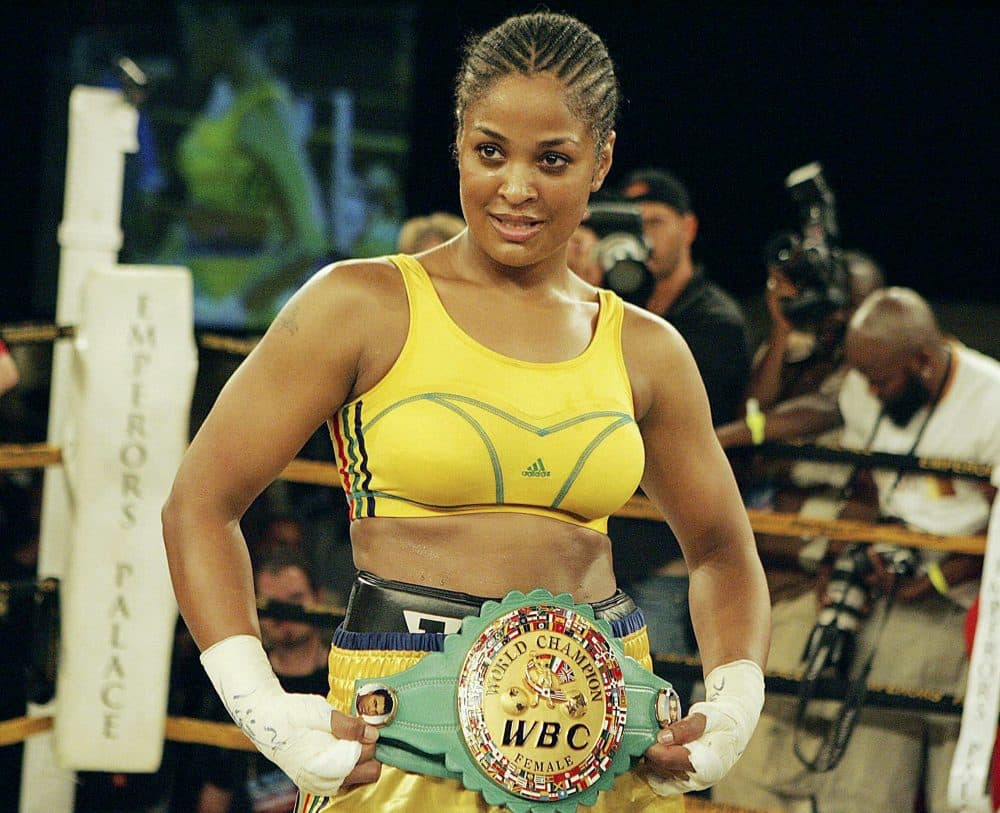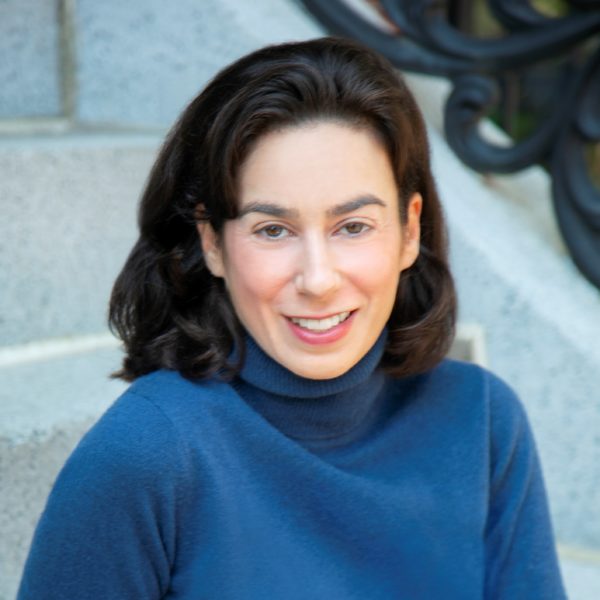Advertisement
Laila Ali Is Undefeated — Even Against Her Father
Resume
Want more Only A Game? Follow along on Facebook and Twitter.
"My dad met his match when he had me, OK," Laila Ali jokes. "That's the funny thing. My father met his match and he knew it."
Laila Ali can laugh about it now, but being Muhammad Ali’s youngest daughter wasn’t easy. That’s because Laila is a lot like her dad. She’s passionate, confident, charismatic, opinionated, strong-willed, fearless. And she hates backing down from a fight.
So, they clashed.
Round 1
The first big fight happened when Laila Ali was 7 years old.
"I remember pretty much waking up early in the morning because we had to pray," Ali says. "And as a kid, that alone was, like, ‘Why do I have to do this? Like, why do I have to wake up? Why do I have to wake up out of my bed? Pray to God?’ And then going to the mosque — why did the women need to sit behind the men? All of that just didn't feel natural to me. And I felt like whatever is in my heart is in my heart. I don't care how old I am."
She knows now that her father put everything on the line for his religion. But that’s not something little kids understand.
Muhammad Ali converted to Islam in 1964.
Two years later, citing his religious beliefs, he filed for conscientious objector status and refused to support the Vietnam War. He was arrested, found guilty of draft evasion and stripped of his boxing titles.
A legal battle followed. Muhammad Ali didn’t fight for nearly four years. Eventually, the Supreme Court overturned his conviction.
A little more than a decade later, Laila Ali made her stand against Islam.
"My father and I, at a very young age, had to deal with the fact that I didn't want to be Muslim growing up," Ali says. "And I remember him saying, 'You don’t know enough about the religion.' And I said 'I know enough. That’s exactly what I know. I know enough about it to know I don’t want to be it.' My father was not only disappointed when I told him that I didn't want to be Muslim. He was angry."
Laila Ali left Islam and later embraced a religion she found more spiritual and less rule-bound. Her father eventually accepted her choice.
So she won that battle. And that wasn’t all she won.
"Yeah, I definitely think my father respected the fight in me," Ali says. "He saw the same fight that was in him in me. Because he, even though he was fighting for different things, he was the same way. He went with what he believed in. He stood up for what he believed in. And he wasn't afraid to say it."
Round 2
When she was 19, there would be a rematch -- after Laila Ali started boxing.
"A lot of people assume it was because of my father," Ali says. "Like, I was that young girl in the gym with him and I was like, 'Oh, I want to be like my dad.' But actually I never even thought about boxing until I saw it with my own eyes — women, in the ring. And I started training, pretty much in secrecy. Then at a certain point my father found out that I was training to be a boxer and I, in fact, was planning to go pro. So he came into town. And he says, 'I hear you wanna be a boxer.' And I said, 'Yes.' And he let me know right away that he didn't really feel women should box. He wasn't comfortable with it.
"And then he said, 'What's going to happen if you get knocked down?' And I was like, 'Well, if I get knocked down, I'm going to get back up, just like you did.' 'Well, what happens if you get knocked out?' 'Well, if I get knocked out — I don't think it's going to happen — but I'll ask for a rematch.'"
Muhammad Ali still wasn’t convinced Laila belonged in the ring. Not his baby girl.
"He said, 'What's going to happen if you get knocked down?' And I was like, 'Well, if I get knocked down, I'm going to get back up, just like you did.'"
Laila Ali
On Oct. 8, 1999, Laila Ali made her professional boxing debut in upstate New York. And her father was there.
Laila Ali won her first fight by knockout. In 31 seconds.
"After my fight, and I looked around the ring and I locked eyes with my father and I looked in his eyes because my father doesn’t have to say much," Ali remembers. "It’s just a look that he gives you. And I saw happiness in him and I saw that he enjoyed the moment. So it was just like he was in that moment with me. He knows what it feels like to be in a ring. He knows what it feels like to have thousands of people watching you and having all this pressure on you to perform well. And he knows what it feels like to win.
"My father came to my dressing room and he gave me hug and he gave me a kiss and I looked at him because I’m like, ‘What’s he going to say now?’ He’s like, ‘Girl, you bad.’ Meaning you’re good. 'Girl, you bad.' He was kind of living through me a little bit as I danced around the ring like he used to.”
Muhammad Ali went to as many of his daughter’s fights as he could, even as his health declined because of Parkinson’s disease.
And he liked what he saw.
"Our style in the ring, the way I move around the ring — of course, I’m not comparing it to my father, but there’s a lot of similarities there because our body types are the same," Ali says. "And I knew that he was loving the ‘Ali’ chant every time that he came into the arena. He missed boxing. He missed being able to just move around, walk around, talk, do the things that he used to do. Because of his Parkinson’s disease, he wasn’t able to anymore. So, I felt like I was fighting for both of us."
Fighter To Fighter
And the boxing icon who once thought women didn’t belong in the ring gave his daughter advice. Fighter to fighter.
"My father had a really great jab, fast, lightning fast," Ali says. "And he came up to me and he says, 'You know, you gotta pretend there’s a fly on the bag and you’re trying to hit it before it flies away.' And that really stuck with me. Like, that’s how fast you need to try to throw your jab. Because otherwise, I'm just throwing my jab. Pap, pap, pap. Hitting the bag. Pap, pap, pap. You’re not really thinking PAP, PAP, fast, fast, fast, like trying to hit a fly. So, just that visual that he gave me was really helpful and I actually did start using it. Of course, my jab wasn't as fast as his."
During her boxing career, Laila Ali won multiple world titles. She retired in 2007…undefeated.
Now, she’s a fitness and wellness expert and television host, encouraging people to live healthier.
Her father died last June.
"Not too long ago, I said, 'Mom, you know, do you really think daddy was really, really proud of me? Or do you think he was just trying to make me feel good, like, girl, you're bad and all that kind of stuff?' She’s like, 'No. Your dad really was proud of you.' She’s like, 'You changed his mind about boxing and women in sports.' And then she’s, like, 'That was big because you know your father, he’s very hard headed.' And I was like, 'You’re right. I did. You’re right. I won that battle against Muhammad Ali.'"
To hear more from Laila Ali, check out video of her recent conversation with Christine Brennan at the Radcliffe Institute.
This segment aired on June 17, 2017.
